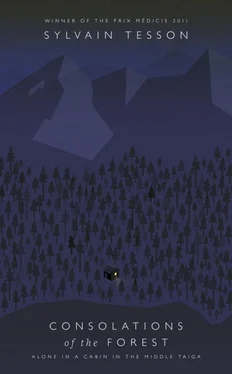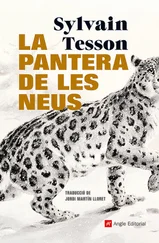At Zavorotni, Miollis and Desvaux leap onto the boat, whose diesel engines we had heard warming up a good hour before arriving at the dock. We’ve barely time to shake hands. I like this kind of farewell, it’s like taking a tumble.
That evening, Sergei, sad-eyed Yura and Sasha of the missing fingers arrive in Zavorotni by boat. We prepare a feast of smoked fish, nalim [12] The nalim is a kind of burbot (a codlike fish) that is usually 18–20 inches long and weighs between 11 and 15 pounds. This description from a Russian English-language website about native freshwater fish says it all: ‘Large, widespread fish. A body extended, covered with very small scales with the big layer of slime. On either side of nostrils on a small short moustache, one more short moustache – on a chin. Colouring of a body from grey-black and dark-brown to brown with a reddish shade and the big stains or divorces. A belly light.’
liver, caviar with wild onion and grilled venison. Sasha pours us his homemade rotgut. These Russians have a way of tossing back their drinks and grabbing hunks of meat that displays their pride in bypassing all commercial resources. They live exclusively off the forest, and taking what you need from the woods guarantees contentment. Such men operate autonomously in the order of things, but remain bound to the traditions of their fathers, and they are worlds away from the free-thinkers who have thrown off all ties to God and princes but depend on cities and their services for food, warmth and transport. Who is right? The autarkic muzhik who commends his soul to heaven but never sets foot in a store? Or the modern atheist, liberated from all spiritual corsetry, but forced to live on the tit of the system and obey all injunctions imposed by life in society? Must one kill God but submit to legislators, or live free in the forest while still fearing the spirits? Practical and material autonomy doesn’t seem a less noble achievement than spiritual and intellectual autonomy. In On Democracy in America , in the chapter ‘What Type of Despotism Democratic Nations Have to Fear’, Tocqueville writes: ‘One forgets that it is above all in the details that it proves dangerous to enslave men. For my part I would be inclined to believe liberty less necessary in great things than in the lesser ones.’ This evening, emptying bottles with the woodsmen of the taiga, I take sides. For the gods, princes and beasts, and against the penal code.
‘We’re taking you home!’ exclaims Sergei suddenly. And we throw ourselves into an activity at which Russians excel: raising a toast, breaking camp in a hurry, tossing baggage into a boat and taking off full speed for no matter where. No matter where – as long as the wind blows, the world is pitching and rolling, and inebriation carries the day with the promise of finding something new at the end of the journey.
There’s nowhere more propitious for meditation than an aluminium boat en route across a fog-shrouded lake. Sometimes the edge of a cliff manages to tear the curtain of mist; sections of shore appear and melt away again. I hate manifestations . Except when they are revelations of beauty. Our journey resembles thought: the mind proceeds through cotton wadding until a sudden breakthrough permits a glimpse of something. Floating in formlessness, we see the light and can put a name to the shadows.
Sergei cuts the engine and we down a glass in the humid silence. We’ve been drinking for hours and are soused. Sprawled over the gas cans and fishing nets, sucking on my cigarette, heading through fog in a boat with a drunken captain, I feel reassured. Having lost my lover, I have nothing more to lose. Misfortune casts off ties. Happiness is an obstacle to serenity. When I was happy, I was afraid of unhappiness.
24 JUNE
Throughout Midsummer Day, the sky puts on a superb show. The foehn, that warm, dry wind arising in the lee of a mountain range, caps the summits with clouds and covers the forest with mist as gently as if veiling the amours of shameless animals.
In the hammock, I study the shapes of the clouds. Contemplation is what clever people call laziness to justify it in the eyes of the supercilious, who watch to ensure that we all ‘find our place in an active society’.
25 JUNE
Another day of looking at the sky. Swarms of insects in the gold-dust sunlight. Later, a salmon-coloured moon swims up the current of the night to go lay its single monstrous egg in a nest of clouds. Simply put: there’s a full and blood-red moon.
26 JUNE
The wrenching sight of drowned butterflies, hundreds of them floating on the lake, some of them still strong enough to struggle. I transform my kayak into a rescue patrol boat and delicately collect the insects one by one. Poor sky flowers fallen on the field of honour… Soon thirty butterflies decorate my blue boat with limp stars. I’m the captain of an ark for Hymenoptera.
27 JUNE
I reach Elohin, with the wind at my back. Stormy weather is on the way, dashing all hopes of sun. Elohin takes on its dismal outpost look. I have an appointment with Mikhail Hippolitov, a reserve inspector who has promised to take me along on his visit to a cabin a day’s march beyond the peaks. At noon, in a high wind, bowlegged under the weight of fifty-some pounds of vodka and canned goods, I toil along behind Hippolitov as he trots over the taiga. We ascend the forested slopes above the promontory of Elohin. Hippolitov takes off like a cannonball, slows, announces brief halts, leaps to his feet, and winds up 650 feet above me. Below the pass, at 4,265 feet, pummelled by gusts of rain, my friend requires tea. The situation becomes very Russian: lying beneath low-hanging pine branches, we wait for our tiny fire to heat a pint of water amid the slabs of schist.
Two saddles covered with graphite pebbles open in the ridge, allowing access to a high, marshy plateau. The wind rises, and we wait out a violent squall, huddling behind a rocky projection. It’s a voluptuous feeling, walking for miles over springy lichen. You’d almost dream of becoming a herbivore. Partridges squawk at our passing. Centuries of wind have shaped the dwarf pines into labyrinths as tangled as viscera. Strands of moss drip from trees. In the boggy areas, gravity has weighed more heavily on the vegetation than any tropism towards the sky. Crossing into a valley we find a 1,000-year-old cedar that goes back before the time of the Mongols. We pass forests of firs, crystalline streams, mountain ‘shelves’ infested with insects, and sloughs where our boots sink deeply into the mud. 54º 36.106´N / 108º 34.491´E brings us to Hippolitov’s cabin, built two years earlier right on the border of the nature reserve. It’s ten feet by ten feet, a haven constructed on the flank of a valley through which winds a river. A conical mountain bristling with evergreens forms the horizon. Wild onion, rhubarb and bear’s garlic grow plentifully nearby, well guarded by swarms of mosquitoes. It’s the kind of place I like: an area apart, where the evening light falls more softly than elsewhere, as if from pity.
Mikhail plays the host: a salad of wild greens dressed with mayonnaise, along with pepper vodka and lard soup. From my pack I pull a three-litre bottle of beer that we drink dry before it even has a chance to go pffft.
28 JUNE
We walk up a valley clotted with vegetation. And we’re staggering like two drunks who’ve decided to climb a mountain pass after hitting a bar. Every step is a triumph over a cascade of stones, a tangle of roots or a mini-quagmire. The river flows on indifferently, having a long way to go before reaching the Arctic Ocean via the Lena. At 4,000 feet, the forest leaves the task of masking the rocks to the dwarf pines. Faithful to the Russian principle whereby there can be no excuse – not war, not exodus – for skipping teatime, we spend an hour coaxing fire from a few soaking-wet twigs.
Читать дальше












